Tottenham Hotspur FC
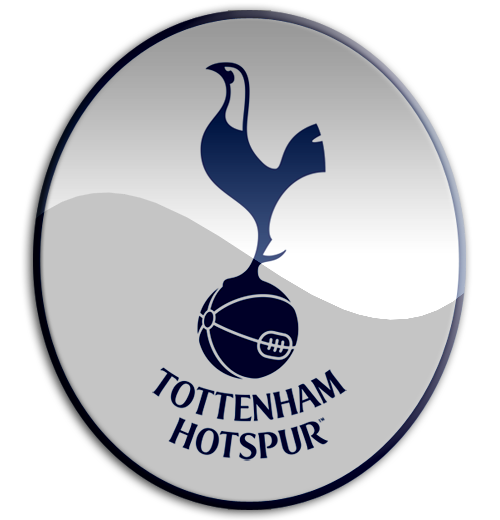
Details
- Name:Tottenham Hotspur Football Club
- Nickname: Spurs / Lillywhites
- Founded: 1882 (as Hotspur FC)
- Renamed: 1884 to Tottenham Hotspur FC
- Ground: Tottenham Hotspur Stadium
- Ground capacity: 62,850
White Hart Lane
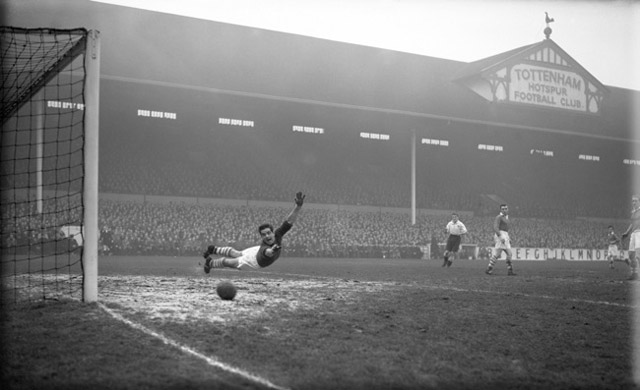
- Tenants: Tottenham Hotspur F.C. (1899–present) & London Monarchs (NFLE) (1995–1996)
- Capacity: 36,284 - Opened: 1899
White Hart Lane is an all-seater football stadium located in Tottenham, London, UK. Built in 1899, it is the home of Tottenham Hotspur in the Premier League and, after numerous renovations, the stadium has a capacity of 36,284.
Along with housing Tottenham, the stadium, which is known amongst fans as the Lane, has also been selected for England national football matches and England under-21 football matches.
White Hart Lane held capacity records in the early 1960s with numbers entering the 70,000s but as seating increased in popularity, the stadium has levelled out to a modest number in relation to other Premier League clubs. The record attendance remains an FA Cup tie on 5 March 1938 against Sunderland with the attendance being recorded at 75,038.
Plans are afoot for Tottenham to move to a new stadium with an estimated capacity of 56,250, with the new stadium being built on the current site instead of moving from the borough of Haringey. The new stadium has been designed by KSS Design Group, whose other work includes Stamford Bridge.
Tottenham Hotspur moved to White Hart Lane in 1899, renovating it from a disused nursery owned by the brewery chain Charringtons, with the help of local groundsman, John Over, into a substandard football pitch. The first game at White Hart Lane resulted in a 4–1 home win against Notts County with around 5,000 supporters attending and witnessing the first game and first victory at the new ground, although referred to at the time as either High Road ground or White Hart Lane.
White Hart Lane underwent redevelopment in the early 20th century with stadium developer, Archibald Leitch, designing a mainly square stadium seating 15,300 and incorporating a standing paddock for another 700 fans along with the famous cockerel being placed on the mock-Tudor apex at the end of the 1909–1910 season.
Redevelopments continued in the 1910s, with the wooden eastern stand replaced with an enlarged concrete stadium, vastly increasing the stadium capacity to over 50,000. The ground continued to be renovated and in 1925, thanks to the FA Cup win in 1921, both the Paxton Road Stand and Park Lane Stand were enlarged and mostly covered from the elements.
The pitch was overlooked by a bronze fighting cock (the club mascot) that still keeps an eye on proceedings from the roof of the West Stand. The pitch was overlooked by a bronze fighting cock (the club mascot) that still keeps an eye on proceedings from the roof of the West Stand.
In the 1930s, football had a popular following, and despite Tottenham's lack of success, at the time, 75,038 spectators squeezed into White Hart Lane in March 1938 to see Spurs' performance against Sunderland in the FA Cup. The venue hosted some of the football preliminaries for the 1948 Summer Olympics.
1953 saw the introduction of floodlights with their first use being a friendly against Racing Club de Paris in September of that year. These were renovated again in the 1970s and steadily replaced with new technology since. By this stage, Tottenham were firmly established as one of England's best clubs which attracted some of the highest attendances in the country on a regular basis. Between 1908 and 1972, White Hart Lane was one of very few British football grounds that featured no advertising hoardings at all.
Perimeter fencing was erected between the stands and the pitch during the 1970s to combat the threat of pitch invasions from hooligans; however this was removed on 18 April 1989 for safety reasons in reaction to the Hillsborough disaster three days earlier, in which 96 Liverpool fans were fatally injured, most of them crushed to death against the perimeter fencing in an overcrowded standing area.
The West Stand was again renovated in the early 1980s, however the project took over 15 months to be completed with cost overruns having severe financial implications. This West Stand is parallel with Tottenham High Road and is connected to it by Bill Nicholson Way.
The early 1990s saw the completion of the South Stand (on Park Lane) and the introduction of the first Jumbotron video screen, of which there are now two, one above each penalty area. The renovation of the Members' (North) Stand which is reached via Paxton Road was completed in 1998, leaving the ground in its present form. At the turn of the millennium, after falling behind in stadium capacity, talks began over the future of White Hart Lane and Tottenham Hotspur's home.
Over the years, many stadium designs and ideas were rumoured in the media. Most recently a move to Wembley Stadium was ruled out by the club, as was talk of moving to the future stadium of the 2012 Olympic Games. However, ostensibly as back-up planning to the plans for a new stadium (see below), Tottenham registered interest in making use of the Olympic Stadium in conjunction with AEG, owners and operators of The O2 in London's Greenwich, formerly known as the Millennium Dome.
Structure and facilities
The outer White Hart Lane frame is designed in a square shape, with the inner seating tiers having a more rounded-square shape to maximise the amount of seats possible within the structure. The cockerel is placed upon the West Stand, with the West Stand located on Tottenham High Road, the East Stand being on Worcester Avenue, the North Stand on Paxton Road and the South Stand on Park Lane.
Park Lane and Paxton are adopted as stand names by the fans when chanting during matches, with the East stand referred to as The Shelf side, but officially the names of the stands are their compass locations.
The pitch is maintained by Stadium Grow Lighting, a series of heated lights which maintains the grass quality and also allows the grass to grow at all times of the year and in all seasons. The SGL system controls all aspects of the pitch when in use, including variables such as water intake, heat allowance, light allowance and other aspects which decrease the quality of a football pitch. The pitch is available for hire when not in matchday use, with full Premier League officials and even Jumbotron use, hoarding advertising and a DVD-quality recording of the match available along with the executive suites for weddings, birthdays and other functions.
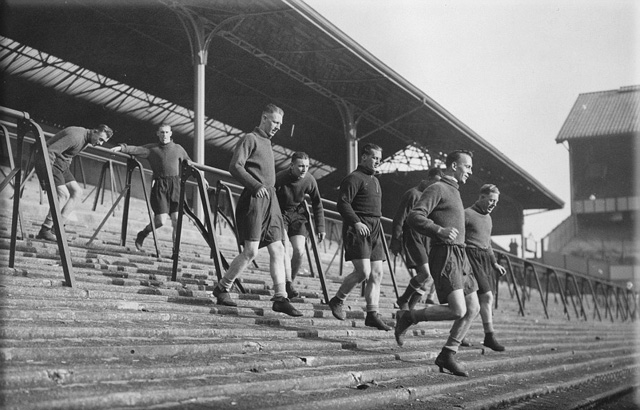
Tottenham players are seen here in training at their White Hart Lane home in early 1938.
The players identified in this picture are Willie Hall, Jackie Gibbons, Ralph Ward, Albert Page, Arthur Hitchins, Fred Sargent and Bill Whatley. In the 1937-38 season, the penultimate campaign before World War Two, Spurs finished fifth in Division Two.
Demolition & New Stadium
Tottenham played their final Match at White Hart Lane on Sunday 14th May 2017, with a 2-1 victory over Manchester United, before the bulldozers started to demolish her, to make way for a new 61,559-capacity ground on the same site.
Although both victor Wanyama, and Harry Kane scored for Spurs, the honour of scoring the final goal on the White Hart Lane pitch fell to Wayne Rooney, in the 71st minute, but it wasn't enough to stop the London club from taking all 3 points and a Runner-up place in the 2016-17 Premier League campaign.
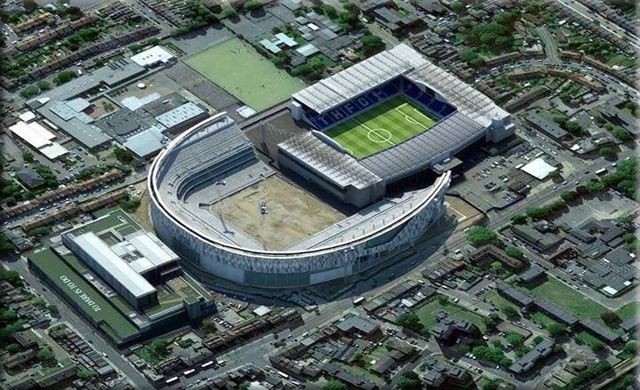
Honours
- Football League First Division:
- Winners (2): 1950–51, 1960–61
- Runners-up (4): 1921–22, 1951–52, 1956–57, 1962–63
- Premier League:
- Runners-up (1): 2016-17
- Football League Second Division:
- Winners (2): 1919–20, 1949–50
- Runners-up (2): 1908–09, 1932–33
- Southern League:
- Winners (1): 1899–1900
- Western League:
- Winners (1): 1903–04
- FA Cup:
- Winners (8): 1900–01, 1920–21, 1960–61, 1961–62, 1966–67,
- 1980–81, 1981–82, 1990–91
- Runners-up (1): 1986–87
- League Cup:
- Winners (4): 1970–71, 1972–73, 1998–99, 2007–08
- Runners-up (3): 1982, 2002, 2009
- FA Charity Shield:
- Winners (7): 1921, 1951, 1961, 1962, 1967*, 1981*, 1991*
- Runners-up (2): 1920, 1982
- (* shared)
- UEFA Cup:
- Winners (2): 1971–72 (inaugural winners), 1983–84
- Runners-up (1): 1973–74
- UEFA Cup Winners' Cup:
- Winners (1): 1962–63
- Anglo-Italian League Cup:
- Winners (1): 1971
Ange Postecoglou

The Facts
Tottenham Hotspur Football Club commonly referred to as Spurs, is an English football club located in Tottenham, London, that plays in the Premier League.
The club's home stadium is White Hart Lane.
Its newly developed training ground is in Bulls Cross on the northern borders of the London Borough of Enfield.
Founded in 1882, Tottenham won the FA Cup for the first time in 1901, making it the only non-League club to do so since the formation of the Football League.
Tottenham was the first club in the 20th century to achieve the League and FA Cup Double, winning both competitions in the 1960–61 season.
After successfully defending the FA Cup in 1962, in 1963 it became the first British club to win a UEFA club competition – the European Cup Winners' Cup.
In 1967 it won the FA Cup for a third time in the 1960s.
In the 1970s Tottenham won the League Cup on two occasions and was the inaugural winner of the UEFA Cup in 1972, becoming the first British club to win two different major European trophies.
In the 1980s Spurs won several trophies: the FA Cup twice, FA Community Shield and the UEFA Cup in 1984.
In the 1990s the club won the FA Cup and the League Cup. When it won the League Cup once more in 2008, it meant that it had won a major trophy in each of the last six decades – an achievement only matched by Manchester United.
The club's Latin motto is Audere est Facere (lit: "To Dare Is to Do"), and its emblem is a cockerel standing upon a football.
The club has a long-standing rivalry with nearby neighbours Arsenal, with head-to-head fixtures known as the North London derby.
For further information check out their Official website or their Fan Forum

Notable Players
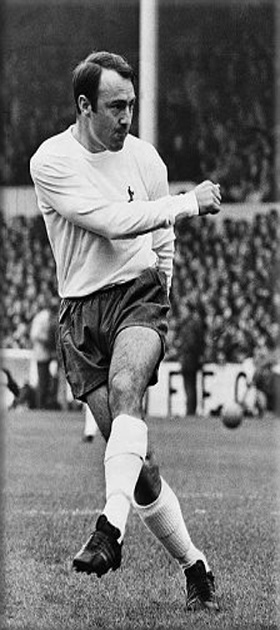
Jimmy Greaves - 1961 to 1970
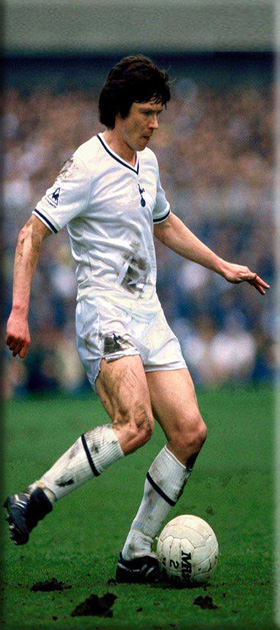
Steve Perryman - 1969 to 1986
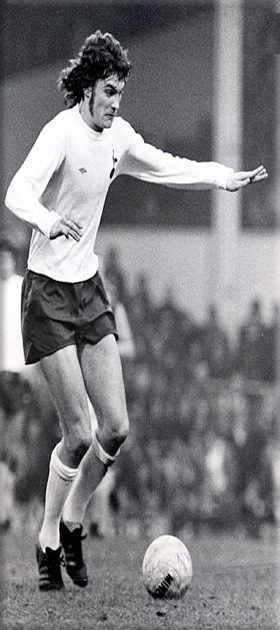
Glenn Hoddle Spurs 1975 to 1987
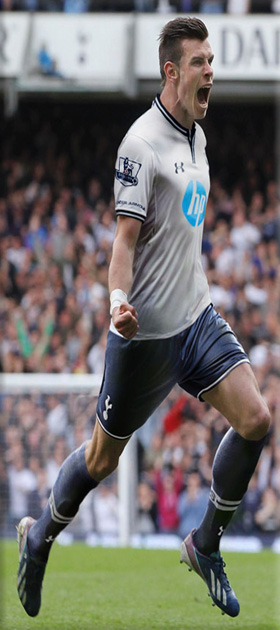
Gareth Bale Spurs 2007 to 2013
History
Tottenham Hotspur F.C. is an English football club based in Tottenham, London. The club was formed in 1882, as Hotspur F.C., and played in the Southern League until 1908, when they were elected into the Football League Second Division. Before this promotion Tottenham had won the FA Cup in 1901, making them the only non-League club to do so since the formation of the Football League.
Since then, Tottenham have won the FA Cup a further seven times, the Football League twice, the Football League Cup four times, the UEFA Cup twice and also the UEFA Cup Winners' Cup. The Cup Winners' Cup victory in 1963 made Tottenham the first English team to win a UEFA competition. In 1960–61 they were the first team to complete The Double in the Twentieth Century.
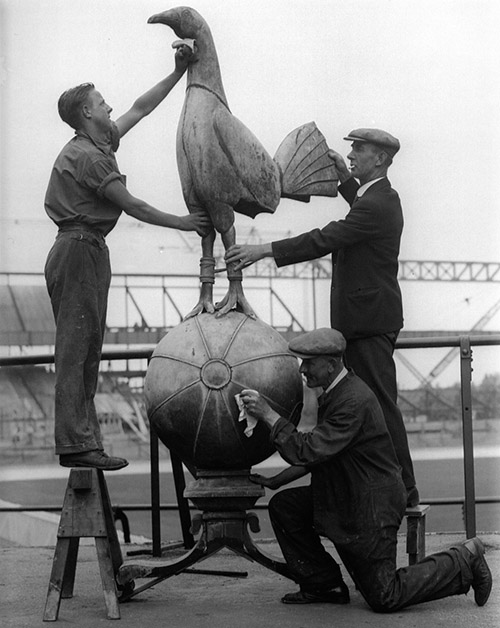 Formation
Formation
On Tuesday 5 September 1882, the Hotspur Football Club was formed by grammar-school boys from the Bible class at All Hallows Church. They were also members of Hotspur Cricket Club. It is possible that the name Hotspur was associated with Sir Henry Percy, who was "Harry Hotspur" of Shakespeare's Henry IV, part 1, and who lived locally during the 14th century and whose descendants owned land in the neighbourhood. In 1884 the club was renamed Tottenham Hotspur Football Club to avoid any confusion with an already established team called Hotspur FC.
Originally, Spurs played in navy-blue shirts. The club colours then varied from light blue and white halved jerseys, inspired by watching Blackburn Rovers win the FA cup at the Kennington Oval in 1884 to red shirts and blue shorts, through chocolate brown and old gold, and then finally, in the 1899–00 season, to white shirts and navy blue shorts, as a tribute to Preston North End, the most successful team of the time.
In 1888 Tottenham moved their home fixtures from the Tottenham Marshes to Northumberland Park, where the club was able to charge for spectator admission. An attempt to join an aborted Southern League, instigated by Royal Arsenal (later Arsenal), failed in 1892, when they were the only club of the 23 applicants to receive no votes. They turned professional just before Christmas 1895 and were then admitted to the Southern League and attracted crowds nearing 15,000. Charles Roberts became chairman in 1898 and stayed in post until 1943.
In 1899 Spurs made their final ground move to a former market garden in nearby High Road, Tottenham. In time, the ground became known as White Hart Lane, a local thoroughfare. Tottenham were the considerable beneficiaries of the escalating unionisation of the northern professional game in the 1890s. Both John Cameron and Jack Bell, formerly Everton players, came to play for Tottenham as a result of the conflict caused by their organisation of the Association Footballers' Union, a forerunner of the Professional Footballers' Association. As a direct result of this, in 1900, Tottenham won the Southern League title, followed the next year by winning the FA Cup – becoming the only non-League club to do so since the formation of the Football League.
Tottenham won election to the Second Division of the Football League for the 1908–09 season, immediately winning promotion as runners-up to the First Division. Their record between 1910–1911 and the Great War was poor and when football was suspended at the end of the 1914–15 season, Tottenham were bottom of the league.
When football resumed in 1919, the First Division was expanded from 20 to 22 teams. The Football League extended one of the additional places to 19th-place Chelsea (who would have been relegated with Spurs for the 1915–1916 season) and the other to Arsenal. This promotion - Arsenal had finished only sixth in Division 2 the previous season - was controversial, and cemented a bitter rivalry (begun six years earlier, with Arsenal's relocation to Tottenham's hinterland) that continues to this day. Tottenham were Division Two Champions in 1919–20 and in the following year, on 23 April 1921, Spurs went all the way to their second FA Cup Final victory beating Wolves 1–0 at Stamford Bridge.
After finishing second to Liverpool in the League in 1922, Spurs experienced a steady decline, culminating in 1928's relegation. Spurs were unable to advance beyond the quarter finals of the FA Cup, getting that far three years running 1935–1938. On 3 September 1939, as Neville Chamberlain declared war, Spurs were seventh in the Second Division. League Football was abandoned for the "duration".
Following the war
Following the war, football was an extremely popular interest attracting thousands of supporters each weekend. By 1949, Arthur Rowe was Spurs manager and developed the "push and run" tactical style of play. This involved quickly laying the ball off to a team-mate and running past the marking tackler to collect the return pass. It proved an effective way to move the ball at pace with players' positions and responsibility being totally fluid. Rising to the top of the Second Division, by 1949-50 they were champions. The next year, Tottenham secured their first ever league title, winning the First Division Championship in 1951. Playing heroes at the time included Alf Ramsey, Ronnie Burgess, Ted Ditchburn, Len Duquemin, Sonny Walters and Bill Nicholson.
The years following this period of success saw a relative decline, as age, injuries and other teams adapting to Spurs' revolutionary style of play meant a struggle for the once-dominant champions. They finished second in 1951–52, grabbing second on goal average as a young Manchester United team beat them to the title. A bad winter, and the terrible state of the White Hart Lane pitch, even by the standards of the day, contributed to this. In 1952–53, Spurs finished tenth, as age began to wear down the "Push and Run" team. 1954 was notable for the signing of one of Spurs' most celebrated players, Danny Blanchflower, for a record £30,000. Also in that year, Spurs were knocked out of the FA Cup by Blackpool.
By this stage, Arthur Rowe had begun to suffer from ill health. He resigned in 1955, with mid-table finishes and boardroom dissent, along with Rowe's health, contributing to his departure. Long time club servant Jimmy Anderson took over. Spurs were nearly relegated at the end of the 1955–56 season. They finished two points above the drop zone. However, the next season saw the club experience a revival, finishing second, though eight points behind the winners, the "Busby Babes" of Manchester United. Tottenham fared well in the following season, finishing third, but ill health now meant Anderson had to quit, being replaced by Bill Nicholson. Nicholson finished eighteenth in the league in his first season in charge, an indifferent start to Tottenham Hotspur's most successful manager's tenure.
The 1960s: The Glory Years and 1970s
Bill Nicholson had joined Tottenham Hotspur as an apprentice in 1936. The following 68 years saw him serve the club in every capacity from boot room to president. In his first game as manager on 11 October 1958, Spurs beat Everton 10–4, their record win at the time. He subsequently guided Tottenham to major trophy success three seasons in a row in the early 1960s: the double in 1961, the FA Cup and European Cup Semi-final in 1962, and the Cup Winners' Cup in 1963. Key players included Danny Blanchflower, John White, Dave Mackay, Cliff Jones, Jimmy Greaves and Terry Medwin. It is interesting to note that Tottenham became the first British team to win a European trophy with their success in the Cup Winners' Cup in 1963 with a 5-1 victory over Atlético Madrid.
After 1964, the "Double" side began to disintegrate due to age, injuries and transfers. Nicholson rebuilt a second team with imports like Alan Gilzean, Mike England, Alan Mullery, Terry Venables, Joe Kinnear and Cyril Knowles culminating in beating Chelsea to win the 1967 FA Cup Final and finished third in the league.
Nicholson added the League Cup (1971 and 1973) and the UEFA Cup 1971–72 to Tottenham's long history before he resigned at the start of the 1974–75 season due to both a poor start, and his disgust at seeing rioting fans in Rotterdam in a UEFA Cup final, which Spurs lost.
Nicholson had won 8 major trophies in 16 years and his spell in charge was the most successful period in the club's history, However, with the squad ageing, Spurs lost their place amongst the elite in English football. Nicholson wished to select his replacement and lined up a 'dream team' of Johnny Giles and Danny Blanchflower to take over, but the Spurs board ignored his advice and appointed ex-Arsenal player Terry Neill, who narrowly avoided relegation at the end of 1974–5. Never accepted by the fans, Neill left the club in 1976 and was replaced by his assistant Keith Burkinshaw that summer.
Tottenham slipped out of the First Division at the end of the 1976–77 season, after 27 years in the top flight. This was soon followed by the sale of their Northern Ireland international goalkeeper Pat Jennings to arch rivals Arsenal, a move that shocked the club's fans and proved to be a serious error. Jennings played on for another eight years for Spurs' rivals.
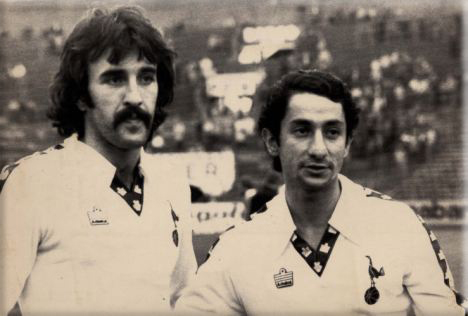 Despite relegation, the board kept faith with Burkinshaw and the team immediately won promotion to the top flight, although it took until the final league game to be promoted. A sudden loss of form at the end of the season meant the club needed a point in the last game at Southampton. To Tottenham's great relief, the game ended 0–0 and Spurs returned to the first division. In the summer of 1978, Burkinshaw caused a notable stir by signing two Argentinian World Cup winning stars Osvaldo Ardiles and Ricardo Villa, which was the kind of transfer coup very uncommon in British football at the time.
Despite relegation, the board kept faith with Burkinshaw and the team immediately won promotion to the top flight, although it took until the final league game to be promoted. A sudden loss of form at the end of the season meant the club needed a point in the last game at Southampton. To Tottenham's great relief, the game ended 0–0 and Spurs returned to the first division. In the summer of 1978, Burkinshaw caused a notable stir by signing two Argentinian World Cup winning stars Osvaldo Ardiles and Ricardo Villa, which was the kind of transfer coup very uncommon in British football at the time.
The 1980s
Spurs opened the 1980s on a high with an FA Cup replay win over Manchester City, 3–2, thanks to Ricky Villa's goal. They lifted the FA Cup again against QPR the next season, and were in contention for four trophies, including the First Division title in which they threatened Liverpool at Easter but ended up fourth. Liverpool also denied Spurs the League Cup in extra time and Barcelona won at home in the Cup Winners' Cup semis after a 1–1 draw at White Hart Lane.
Key players such as Steve Archibald, Garth Crooks, Glenn Hoddle, Osvaldo Ardiles, and long-serving Steve Perryman inspired Tottenham to UEFA Cup glory in 1984, but several weeks before this victory Burkinshaw announced he would be leaving at the end of that season ending his tenure having won three trophies in four seasons
New manager Peter Shreeves and owner Irving Scholar took over. Scholar attempted to restore the club's financial fortunes. In 1983 Tottenham became the first English club to float on the stock exchange. Tottenham enjoyed a strong start to the 1984-85 season, topping the table at Christmas, but they were later leapfrogged by champions Everton and runners-up Liverpool. Their final position of third place in the league would have booked them a UEFA Cup place, but on 29 May 1985, the Heysel disaster, which saw 39 spectators crushed to death by a wall when Liverpool fans rioted at the European Cup final, saw all English clubs banned from European competitions indefinitely. Tottenham, along with the other European-qualified teams, excluding Liverpool, (Everton, Manchester United, Southampton and Norwich City) appealed to have the ban changed to cover Liverpool only, but to no avail. This ruled Tottenham out of the UEFA Cup for the 1985–86.
At the end of the following season, Luton Town manager David Pleat was appointed the new manager following the sacking of Peter Shreeves (after Aberdeen's Alex Ferguson, who would take over at Manchester United later in the year, rejected the offer to take over ), and for much of 1986–87, Spurs Played with a five man midfield (Hoddle, Ardiles, Hodge, Allen, Waddle) backing lone striker Clive Allen, Tottenham remained in contention for all domestic honours throughout the season, however towards the business end of the championship challenges, the endeavours ended in defeat. In the League Cup, Tottenham lost to eventual competition winners Arsenal in the semi-final. Spurs then missed out on the first division title, and, finally, as favourites for the FA Cup over Coventry, stumbled to a 3–2 loss. The close season of 1987 saw the sale of Glenn Hoddle to AS Monaco, and a year later veteran goalkeeper Ray Clemence retired.
Pleat quit in October 1987 following allegations about his private life. He was succeeded by former player Terry Venables, who had built up an impressive managerial record - two promotions with Crystal Palace that had taken them from the Third Division to the First, an FA Cup Final appearance (where they lost to Tottenham in 1982), a fifth place league finish and a UEFA Cup appearance at QPR, and most recently the Spanish league title and a European Cup final appearance with FC Barcelona. However, the Spurs side that he inherited with a quarter of the 1987–88 season was struggling in the league and could only manage a 13th place finish - placing them below sides including Wimbledon, Coventry City and Luton Town.
To invigorate the Tottenham side, Venables paid a national record £2million for Newcastle United midfielder Paul Gascoigne in June 1988, and also signed striker Paul Stewart from Manchester City for £1.7million. In February that year, Venables had also boosted his attack with a £500,000 move for Liverpool striker Paul Walsh. Spurs made a shaky start to the 1988–89 season, being second from bottom at the end of October but improving to ninth place by the turn of 1989 and finishing sixth in the final table.
July 1989 saw the arrival at White Hart Lane of England striker Gary Lineker from FC Barcelona for a fee of £1.1million.
1990s
In 1990, a slump in the property market left chairman Irving Scholar on the verge of bankruptcy, although they had finished third in a title race in which Liverpool finished champions. Spurs had also finished one place above neighbours Arsenal. The ban on English clubs in European competitions was lifted for the 1990-91 season, but only one place in the UEFA Cup would be granted to the English league - meaning that Aston Villa took that place as league runners-up and Tottenham missed out.
Venables joined forces with businessman Alan Sugar to take over Tottenham Hotspur PLC and pay off its £20 million debt, making turn around specialist Claude Littner CEO. During the 1990–91 season, Midfielder Paul Gascoigne became a transfer target for Italian club Lazio and when the takeover deal was nearing completion, it became clear that the multi-million pound sale of Gascoigne would be integral to the financial structure of Tottenham Hotspur.
The 1990-91 season enjoyed its share of incidents, quite apart from the financial crisis and Gascoigne transfer speculation. Spurs began the league season unbeaten from 10 games and third in the league behind Liverpool and Arsenal, who also retained unbeaten records. However, the winter saw a downturn in league form and by the end of February Spurs had sunk to eighth and had lost seven of their previous 15 games. Tottenham failed to re-discover their earlier league form and finished 10th in the final table. However, performances in the FA Cup remained a highlight and Tottenham eventually reached the final. They went a goal down in the 16th minute when Stuart Pearce put a goal past them for Nottingham Forest, and a minute later Paul Gascoigne suffered cruciate knee ligament damage when making a reckless tackle on opponent Gary Charles. Paul Stewart equalised for Spurs in the 55th minute, and an own goal in extra time by Forest defender Des Walker made Spurs the first team to win eight FA Cups - a record which was matched by Manchester United in 1994 and surpassed by them in 1996. It is still their most recent FA Cup triumph to date.
When the extent of Gascoigne's knee injury was confirmed, it became clear that he would be out for most if not all of the following season. His transfer to Lazio was put on hold, and Gascoigne injured his knee again in a nightclub incident five months after the FA Cup Final - putting paid to any chances that he would play a game in the 1991–92 season. It also ended his hopes of playing at Euro 92, but by the end of the 1992 close season his knee had recovered and he completed his move to Italy for £5.5million.
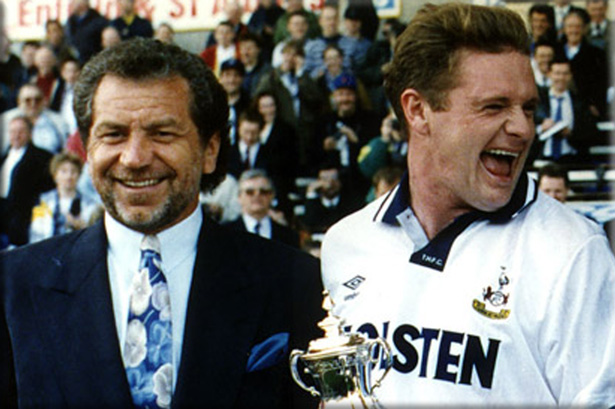 In 1991-92, Venables became chief executive, with Shreeves again taking charge of first-team duties. Spurs were competing in Europe that season, in the UEFA Cup Winners' Cup, reaching the quarter-final where they were edged out by Dutch side Feyenoord. Gary Lineker, who in November confirmed that he would be leaving Spurs at the end of the season to play in Japan, scored 28 goals and was voted Football Writers' Footballer of the Year, but these goals were not enough to prevent Tottenham from under-performing throughout the campaign, losing 20 games as they finished 15th.
In 1991-92, Venables became chief executive, with Shreeves again taking charge of first-team duties. Spurs were competing in Europe that season, in the UEFA Cup Winners' Cup, reaching the quarter-final where they were edged out by Dutch side Feyenoord. Gary Lineker, who in November confirmed that he would be leaving Spurs at the end of the season to play in Japan, scored 28 goals and was voted Football Writers' Footballer of the Year, but these goals were not enough to prevent Tottenham from under-performing throughout the campaign, losing 20 games as they finished 15th.
The 1992-93 season saw Peter Shreeves sacked as head coach and replaced by joint head coaches Doug Livermore and Ray Clemence. Spurs became founders of the new Premier League, created by the Football Association as replacement for the Football League First Division as the highest division of English football. To coincide with the massive changes in English Football, Tottenham made a number of major signings. They paid a club record £2.1million for Nottingham Forest striker Teddy Sheringham, £750,000 for Southampton defender Neil Ruddock and £1.75million for Portsmouth's highly rated 19-year-old winger Darren Anderton. In the first ever Premier League season, Spurs finished eighth, with Teddy Sheringham being the division's top scorer with 22 goals, 21 for Tottenham Hotspur and 1 for Nottingham Forest, and also reached the FA Cup semi-final, losing 1-0 to Arsenal.
June 1993 saw Terry Venables controversially dismissed from the Tottenham board by chairman Alan Sugar, whose decision was overturned in the High Court but then reverted on appeal.
The departure of Venables saw Tottenham return to a conventional management setup after two seasons of a two-tier structure. Taking charge of the first team was former player Ossie Ardiles, who since starting out in management four years earlier had enjoyed mixed success with his tactical approach which was centred on attacking football, it had seen promotion with Swindon Town and West Bromwich Albion, though the promotion at Swindon Town was cancelled due to financial irregularities which occurred before Ardiles was appointed, but had almost resulted in Newcastle United falling into the third tier of the football league. At Tottenham, Instead of progressing on the eighth place finish and FA Cup semi-final appearance the previous season, Spurs performed poorly and relegation was soon becoming a real possibility. In the end, they achieved survival with a 15th place finish, but were soon under investigation for financial irregularities which had allegedly taken place in the 1980s when Irving Scholar was still chairman. In June, they were found guilty of making illegal payments to players and received the heaviest punishment ever dished out to an English club - a £600,000 fine, 12 league points deducted for the 1994-95 season, and a ban from the 1994-95 FA Cup. However, the points deduction and FA Cup ban were later quashed on appeal, although the fine was increased to £1,500,000.
However, Ardiles was determined that Spurs would succeed in 1994-95, and began the season by signing two players who had appeared at that summer's World Cup - German striker Jürgen Klinsmann and Romanian winger Ilie Dumitrescu - to bolster a forward line which already included Teddy Sheringham, Darren Anderton and Nick Barmby. But Spurs still struggled as the 1994-95 season got under way, and Ardiles was dismissed on 1 November 1994 with the club standing 17th in the relegation zone, they would have been 11th at this stage but the points deduction stood at 6 points, reduced on appeal from the original 12, before being quashed completely.
Ardiles was replaced by Gerry Francis, who alleviated the relegation fears and oversaw the club's climb to seventh place in the league - just missing out on a UEFA Cup place. When the FA Cup ban was lifted, Spurs reached the FA Cup semi-final where they were defeated 4-1 by eventual trophy winners Everton. Klinsmann was top scorer at the club with 29 in all competitions, but frustrated by the failure to qualify for European competition he returned to his homeland when he signed for Bayern Munich. Over the next two years, Francis added the likes of Ruel Fox, Chris Armstrong, Les Ferdinand and David Ginola to the ranks at White Hart Lane, while players including Teddy Sheringham, Ilie Dumitrescu and Gheorghe Popescu departed, but his wheeling and dealing failed to deliver European qualification or higher as they finished eighth in 1996 and tenth in 1997.
Francis was sacked in November 1997 after Spurs were crushed 4-0 by Liverpool - a result which left them 16th in the Premier League.
Christian Gross, coach of Swiss champions Grasshoppers, was appointed. He failed to turn around the club's fortunes, however, and the team battled against the drop for the remainder of the campaign. Legendary striker Jürgen Klinsmann was re-signed in December on loan and four goals in a 6–2 win away to Wimbledon in the penultimate game of the season was enough to secure survival.
Gross, despite having finished the last season on a high by only losing one of their last nine games, was sacked just three games into the following season, and George Graham was soon hired to take over.
Despite heavy criticism from fans due to Graham's previous association with Arsenal, in his first season as Spurs manager the club secured a mid-table finish and won the League Cup. In the final against Leicester City at Wembley, full-back Justin Edinburgh was sent off after an altercation with Robbie Savage on the hour mark, but Spurs secured a dramatic victory through Allan Nielsen's diving header in the 93rd minute of the game. Spurs also reached the semi-finals of the FA Cup, where they were beaten 2–0 by Newcastle after extra-time. To cap a good season, star player David Ginola won both the PFA Players' Player of the year 1999 and Football Writers' Association Footballer of the Year 1999 awards.
Following the 1999–00 and 2000–01 campaigns, Sugar's patience broke. He sold his controlling interest to ENIC Sports PLC, run by Daniel Levy.
2001-2005: Mid table wilderness
Team management passed to Tottenham legend Glenn Hoddle who took over in April 2001 with the team lying thirteenth in the table. His first game saw defeat to Arsenal in an FA Cup semi-final. The club captain, Sol Campbell, after a season in which he made repeated statements in the media outlining his desire to remain at Tottenham, joined Arsenal on a Bosman free transfer that summer. By signing Campbell on a 'free transfer', Arsenal were spared a hefty transfer fee for one of the best defenders in the country at the time. Consequently, they were able to offer Campbell a contract believed to be worth in the region of £100,000 per week. The loss of a transfer fee by Spurs, the move to their bitterest rivals, and the perceived underhanded fashion in which he negotiated his move, led to Campbell being vilified by Spurs fans thereafter. The relationship was further soured several years later (after Campbell had moved to Portsmouth) by accusations that he had been subjected to racist and homophobic chants during a match against Spurs. While the national media argued Campbell's part, the police sought prosecutions against 16 fans, some of them children, filmed as taking part in the chants. The chanting, which was quoted by the Magistrate as "Well-Rehearsed" and well-planned, included Lynching and HIV. Campbell meanwhile has never expressed regret or remorse over his defection to Spurs' fiercest rivals.
The summer before Hoddle's arrival as manager, Tottenham had plunged into the transfer market for their first eight-figure signing when they paid Dynamo Kiev £11million for Ukrainian striker Sergei Rebrov. However, Rebrov was not a success at White Hart Lane, managing just 10 goals over the next four seasons (the last of which was spent on loan in Turkey) before joining neighbours West Ham United.
Hoddle turned to more experienced players in the shape of Teddy Sheringham, Gus Poyet and Christian Ziege for inspiration, and Spurs played some encouraging football in the opening months of his management. Season 2001–02 saw Spurs finish in ninth place, as well as reaching the League Cup final, where they lost to Blackburn Rovers, having been the favourites after their 5-1 demolition of Chelsea in the previous round.
The only significant outlay prior to the following campaign was £7 million for Robbie Keane, who joined from Leeds United. 2002–03 started well, with Tottenham in the top six as late as early February, but the season ended with a tenth place finish being the result of a barren final 10 games of the league campaign that delivered a mere seven points. Several players publicly criticised Hoddle's management and communication skills. Six games into the 2003–04 season, with Spurs struggling at the foot of the table, Hoddle was sacked and David Pleat took over on a caretaker basis until a permanent successor could be found.
In May 2004, Tottenham appointed French team manager Jacques Santini as head coach, with Martin Jol as his assistant and Frank Arnesen as Sporting Director. Santini quit the club in bizarre circumstances in early November. He was replaced by Jol, who turned things around and secured a ninth place finish. In June 2005, when Arnesen moved to Chelsea, Spurs appointed Damien Comolli as Sporting Director.
Since 2005: Revival
During 2005–06 Spurs spent six months in the top four, going into the final game of the season, they led rivals Arsenal by a point, but were defeated in their final match, away to West Ham, having been only able to field a weakened team due to a number of players succumbing to an intestinal illness the night before. Spurs were pipped to a Champions League place, but it was success nevertheless in gaining a place in the UEFA Cup. They finished fifth for the second season in a row in 2006–07.
Martin Jol was sacked early into the 2007–08 season, with Juande Ramos ex-Seville coach replacing the Dutchman. Spurs went on to win the League Cup, beating Chelsea 2-1 in the final in February 2008. However, Tottenham endured another dismal start to the season in 2008-09 that placed them bottom of the Premier League and in late October exit from the UEFA Cup after defeat by Italian side, Udinese. The club had made its worst start to a season in its history.
Manager Ramos was sacked. The following day Portsmouth Manager Harry Redknapp was appointed as the new manager of Tottenham.
Director of Football Damien Comolli was also sacked, after criticism of the sales of Dimitar Berbatov and Robbie Keane and failure to replace them adequately. With this change Tottenham reverted to a "traditional" setup with Redknapp in charge of coaching and player transfers. In his first two weeks in charge, Redknapp took the club out of the relegation zone, winning ten out of the twelve points available with wins against Bolton, Liverpool and Manchester City and a 4–4 draw against North London rivals Arsenal. The team finished the 2008-09 campaign 8th in the league table. The January transfer window saw the return of Robbie Keane and Jermain Defoe to the club after spells at Liverpool and Portsmouth respectively.
Spurs won the first four matches of the 2009–10 season, with Redknapp subsequently awarded the Manager of the Month award and Jermain Defoe the Player of the Month award for August. On 22 November 2009, Spurs beat Wigan Athletic 9–1 at White Hart Lane – a record win in the top flight for the club. On 14 April 2010 Tottenham achieved their first Premier League victory against rivals Arsenal at White Hart Lane in eleven years, with goals from Gareth Bale and a spectacular volley from Premier League debutant Danny Rose giving them a 2-1 win.
On 5 May 2010 Spurs reached the qualifying rounds of the Champions League for the first time in their history. This was the first time in five years that the hold of the top four places by Manchester United, Chelsea, Arsenal and Liverpool had been broken and, as in 2005, the team displaced was Liverpool. 2010 was the first time Tottenham finished above Liverpool in the league since 1971.
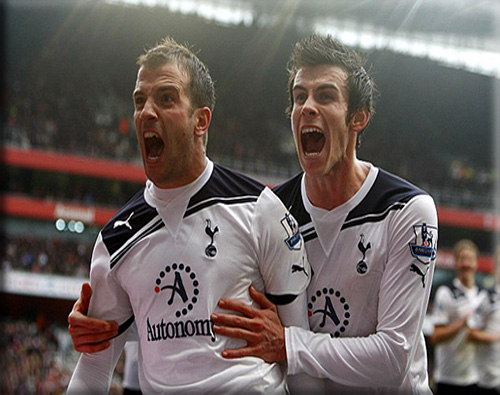 2010-11 season
In early 2010-11, Spurs faced Swiss side Young Boys in a two-leg play off to qualify for the group stages of the Champions League. In the first leg, in Bern, Spurs scored two potentially valuable away goals in a 2-3 loss after at one time having a three goal deficit. In the second leg, played on 25 August, Spurs recorded a comfortable 4–0 win with a goal from Defoe and a hat-trick from Peter Crouch.
2010-11 season
In early 2010-11, Spurs faced Swiss side Young Boys in a two-leg play off to qualify for the group stages of the Champions League. In the first leg, in Bern, Spurs scored two potentially valuable away goals in a 2-3 loss after at one time having a three goal deficit. In the second leg, played on 25 August, Spurs recorded a comfortable 4–0 win with a goal from Defoe and a hat-trick from Peter Crouch.
In the Group stage, Tottenham subsequently came top of a group that also included Inter Milan, Werder Bremen and FC Twente and qualified for the knock-out stages of the competition, where they were drawn to play A.C. Milan. Tottenham won the first leg away at the San Siro 1–0, before a 0–0 draw at White Hart Lane ensured they won the tie on aggregate and progressed to the quarter finals. In the quarter final, Spurs suffered a heavy defeat against Real Madrid in the first leg at the Bernabéu Stadium. On-loan Emmanuel Adebayor (who would later be loaned to Spurs) headed Real Madrid into the lead after 4 mins, and Peter Crouch was dismissed after 15 mins for two yellow cards. Keeping the score down to 1-0 at half time, Spurs tired in the second half and ended up going down 0-4 to José Mourinho's side. On 13 April 2011 Tottenham were knocked out of the Champions League by Real Madrid after a 0-1 defeat at White Hart Lane left them 0-5 down on aggregate.
Qualification for the 2011-12 Champions League became unlikely, with Tottenham failing to defeat four of the clubs battling to avoid relegation from the Premier League (Blackpool, West Ham United, Wigan Athletic and Wolverhampton Wanderers) in a poor last third of the league season, reflected by a drop in the share price of Tottenham Hotspur plc to a 12-month low of 55p on 9 May. This was confirmed on 10 May, when Spurs were defeated 0-1 by Manchester City at Eastlands. After defeating their rivals for the sole available Europa League spot, Liverpool, at Anfield on 14 May however, Spurs secured qualification for the 2011-12 Europa League by beating Birmingham City in the last game of the season, incidentally causing Birmingham to be relegated. Perversely, despite the potential additional revenue that the Europa League might bring, the share price of the PLC fell to a new low of 51.5p on 25 May.
2011-12 season
Tottenham's season started with mixed success. Despite gaining an aggregate 5-0 victory over Heart of Midlothian to secure a place in the UEFA Europa League Group Stage, they did not win their first two games after the scheduled fixture opening their season at home to Everton, was cancelled due to rioting in Tottenham in the days leading up to the game. Spurs lost 3-0 away to Manchester United and 1-5 at home to Manchester City. Tottenham captured 10 wins and 1 draw in their next 11 Premier League matches, propelling them to third place in the league after 13 games. At the end of the season, following short contract renewal talks, Harry Redknapp was sacked by the Tottenham board on 13 June 2012.
2012-14 seasons
Following the sacking of Harry Redknapp, the club appointed former Chelsea and Porto coach Andre Villas-Boas to the manager position. Shortly following this appointment the club pipped Liverpool for the signature of former Swansea loanee and Hoffenheim midfielder Gylfi Sigurdsson. Several days later the club also resolved the protracted transfer saga surrounding Ajax defender Jan Vertonghen. In Villas-Boas' first game as manager, a friendly against Stevenage F.C., Sigurdsson scored his first goal for the club, and a second from Iago Falque sealed a 2-0 victory for Spurs. Throughout the 2012-13 season, they came very close to qualifying for the UEFA Champions League. However, they finished 5th, despite winning a dramatic match against Sunderland with a goal from Gareth Bale in the final match of the season. Their rivals Arsenal won their match against Newcastle 1-0, meaning Tottenham finished 1 point behind Arsenal. This made Spurs go to UEFA Europa League for the second successive season, in which they came to the quarter-finals of the 2012-13 season. In the wake of a 6-0 defeat against Manchester City and a 5-0 defeat against Liverpool, manager Andre Villas-Boas was dismissed from his role on 16 December 2013. Former Spurs player Tim Sherwood was appointed manager.
Sherwood was sacked by chairman Daniel Levy on 13 May 2014
Mauricio Pochettino
On May 27th 2014, Spurs wrote "The Club is delighted to announce the appointment of Mauricio Pochettino as our new Head Coach on a five-year contract." Mauricio joins us from Southampton where he guided them to their highest-ever Premier League finish of eighth place last season. During his 18 months at St Mary's, Mauricio also oversaw the progress of home-grown stars such as Luke Shaw, Adam Lallana, James Ward-Prowse and Calum Chambers.
Mauricio built his coaching reputation in Spain with RCD Espanyol, winning admirers across Europe for his high pressing attacking brand of football as well as for prioritising the development of young players from the side's youth setup before his departure in November, 2012 after almost four years in charge.
Mauricio enjoyed a highly successful playing career, making his debut in 1988 with Argentinian side Newell's Old Boys at the age of 16 and winning the Argentine Primera División with them in 1991. Two spells at Espanyol followed from 1994, sandwiched between time with Paris Saint-Germain and Bordeaux. He won two Copa del Rey titles with Espanyol and also earned 20 international caps with Argentina.
Commenting on the appointment Chairman Daniel Levy said: "In Mauricio I believe we have a Head Coach who, with his high energy, attacking football, will embrace the style of play we associate with our Club. He has a proven ability to develop each player as an individual, whilst building great team spirit and a winning mentality. "We have a talented squad that Mauricio is excited to be coaching next season."
Speaking on his appointment, Mauricio Pochettino said: "This is a Club with tremendous history and prestige and I am honoured to have been given this opportunity to be its Head Coach. There is an abundance of top-class talent at the Club and I am looking forward to starting work with the squad. Tottenham Hotspur has a huge following across the world and I have great admiration for the passion the fans show for this team. We are determined to give the supporters the kind of attacking football and success that we are all looking to achieve."
Mauricio is joined by Jesús Pérez (Assistant Head Coach), Miguel D'Agostino (First Team Coach) and Toni Jiménez (Goalkeeper Coach) with whom he previously worked at both Southampton and Espanyol. At the end of the 2014-15 season, Spurs beat Everton on the final day of the season to finish 5th place in the Premier League.
On Tuesday 19th November 2019, Spurs announced that they have parted company with Mauricio Pochettino after 5 1/2 years at the club. In the early hours of Wednesday 20th November 2019, they stated "We are delighted to announce the appointment of Jose Mourinho as Head Coach on a contract that runs until the end of the 2022/23 season."
On 19th April 2021, Mourinho was sacked, with former Spurs midfielder Ryan Mason taking charge of training until 30th June 2021, when they appointed Nuno Espírito Santo on a 2 year contract. On 1st November 2021, Spurs announced that Nuno had been relieved of his duties after just 10 Premier League matches.
On 2nd November 2021, Spurs announced that Antonio Conte had been given a 2 year contract as Head Coach, with an option to extend.



















